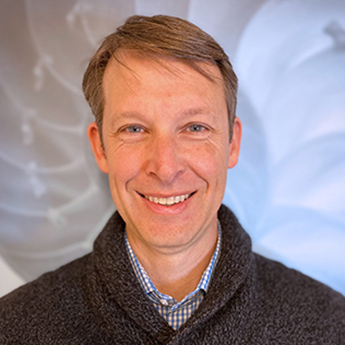Member of the Month: Chris Larson, DO
Direct primary care physician focuses on doctor-patient relationship
By Samantha White

Though he didn’t begin his career in health care, Chris Larson, DO, arrived in the medical field as quickly as he could. Watching the fall of Enron while working in the financial industry made him reconsider, which led him into the world of primary care. He knew even during residency he wanted to practice in a nontraditional way. Years later he would start his own direct primary care practice, where he still works today.
Tell us about your career path.
I have an undergraduate degree in finance from the University of Texas at Austin and started my career in energy investment banking, then energy options trading. The combination of the Enron failure and seeing loved ones get poor care within the health care system led me to consider changing careers. Even while in residency I had identified the downstream effects of accepting insurance as a major part of some of the poor outcomes that led to me considering medicine as a career.
While in residency, I was moonlighting at an urgent care in San Antonio, and continued to work at that urgent care group in Austin after residency. A few years later, around 2013, I started reading about direct primary care and identified it as the business model that would allow me to practice medicine in the way that led me to medical school in the first place. Since starting my direct primary care practice, Euphora Health, in 2014, we have expanded by adding another office in Cedar Park and two other physicians.
Who or what inspired you to become a family physician?
Both Al Faigin, DO, and John Bowling, DO, served as strong primary care role models while I was at Texas College of Osteopathic Medicine. Dr. Faigin delivered multiple babies, did many minor procedures, and took care of all the chronic diseases you would expect in his clinic in Fort Worth. Through my rotation at his office, I started to really understand the breadth of reach that a primary care physician could have.
Dr. Bowling was a teacher and administered the rural health program at Texas College of Osteopathic Medicine. The stories he told of the doctors and students who practiced in rural settings helped open my eyes to the potential Rockwellian nature of the modern doctor-patient relationship.
What unique challenges are represented in your patient community?
My patient panel covers a broad spectrum, each with different challenges. Locally, I work with many small service industry companies that pay me to take care of their employees. Many of these workers have multiple jobs and no traditional insurance. I often find that I am treating an acute issue on top of an existing chronic issue while helping them navigate the most cost-effective route through the health care system, while not depending on any insurance to help them along the way. This group also has a higher percentage of mental health disorders and drug abuse/dependency than others.
I also work with some employers that are remote from my location. For these groups, I offer mainly virtual care by text, phone calls, and video conference. I might go on site to their offices once or twice a year for short visits and to bolster the doctor-patient relationship. The challenge here is how I can wring as much care as possible out of a virtual relationship without increasing risk to the patient.
What made you choose to practice direct primary care?
In order to practice conservative medicine, by focusing on lifestyle change when it’s appropriate and having the time to coordinate care to reduce patient risk, I knew I needed more time than insurance-based primary care would allow. Direct primary care threads the needle of allowing for more time spent on the care of the patient, while keeping prices relatively affordable for members of my community.
Why do you choose to be a TAFP member?
The advocacy that I’ve seen from TAFP for primary care physicians and for direct primary care is unparalleled. Additionally, at a time when other professional medical organizations might be questioned about the ethics of some of their decisions, I’ve never had any qualms about TAFP’s approach or goals.
What do you enjoy doing outside of medicine?
Before having three children in four years, I used to love cooking, bicycling, and astronomy. Now, with an eight, six, and five-year-old I’m finally about to get back to a little bit of time for myself and maybe I can pick up some of these hobbies again soon.
TAFP’s Member of the Month program highlights Texas family physicians in TAFP News Now and on the TAFP website. We feature a biography and a Q&A with a different TAFP member each month and his or her unique approach to family medicine. If you know an outstanding family physician colleague who you think should be featured as a Member of the Month or if you’d like to tell your own story, nominate yourself or your colleague by contacting TAFP by email at tafp@tafp.org or by phone at (512) 329-8666.